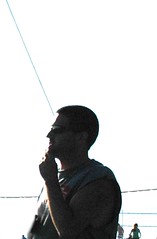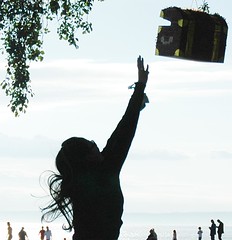 To interview for a job you need to be relaxed in order to communicate effectively, and many people are nervous in job interviews, especially when you are just starting out in your career. So I recommend practicing centering yourself to relax any time and any place. Here's my recommendation for how to approach a job interview.
To interview for a job you need to be relaxed in order to communicate effectively, and many people are nervous in job interviews, especially when you are just starting out in your career. So I recommend practicing centering yourself to relax any time and any place. Here's my recommendation for how to approach a job interview. 1. Shake hands, with a warm deep handshake, feel the energy of the other person and look into their eyes, then prepare for your interview.
2. Sit down, with your hind quarters squarely in the seat.
3. Square your shoulders at right angles to your chest, straighten your spine so you can feel your energy flowing.
4. Breathe the "vase breath",
(a. exhale by using your diaphragm to push out all the air you can
b. inhale slowly through your nostrils so the breath flows down the back of your throat and into the bottom of your lungs and piles up to the top, comfortably.
c. Exhale using the diaphragm again to push the air out slowly the same way as you brought it in.
Repeat your breath two times. To become good at this you may wish to practice this some when you wake up, have lunch, and go to sleep so that you can do it any time.
Air is free - it nourishes you - you deserve all you can get, so get all you can, and it will refresh your nerves and stabilize your mind )
5. Feel the ground you cover all the way to the center of the earth and all the way out to the endless universe... This technique expands your mind and grounds you at the same time. Temporarily wherever you are you own it all.
Notes: The ground you cover is a metaphor for the fact that you need to earn your own living. The universe will provide exactly what you need but your job is to help yourself and others, and that includes finding the right job.
6. Exchange yourself for the person or people about to interview you. Feel their human condition as well as your own. This is mutually respectful and sets the tone for your interview.
7. Speak in a clear voice, and project. Be brief in your answers, and start with a summary, then delve into finer details if there is time.
Culturally some people do not brag, but in Western culture you have to state that which may be obvious from your resume - here's a sentence that does that -
"What makes me the perfect fit for the job you described is that I love to use my intelligence and attention to detail to help people build cool technical solutions and software toys."
8. Stop to clarify anything, such as asking if that is the level of detail the interviewer is seeking. Remember to fulfill your needs first - ask for water, to go to the bathroom, should some need arise, even if you feel nervous explain this to the interviewer etc. They are just a person too. If you have to pause to consider the answer let the interviewer know what you are doing.
9. Look for signs that it is a good match on your side as well. If the interview is a waste of your time, pause, graciously thank them for the time, explain that it does not appear to be a match and leave. It does not matter what the reason is you have for this decision. but it is better to leave than to let it drag on for hours and through several people.

10. Follow up with a thank you letter whether you land the job or not. Work in any discipline in any city can be very small and interconnected.
11. Keep brief records of who, where, and what you interviewed for, with contact information. They need not be any more detailed than that. This can be very useful in the future, such as through LinkedIn.com or similar social business networking site.
12 Always, but always ask for more money, unless the initial offering is liberal, especially if you are female. Woman still tend to be paid less for the same work as men. Asking for more money helps you develop negotiating skills. Never sell yourself short - you can do anything.
And lastly, because an interview is a little like a date, remember to smile, naturally when you feel like it, and keep your examples and stories from past experience as positive and upbeat as possible.
No comments:
Post a Comment